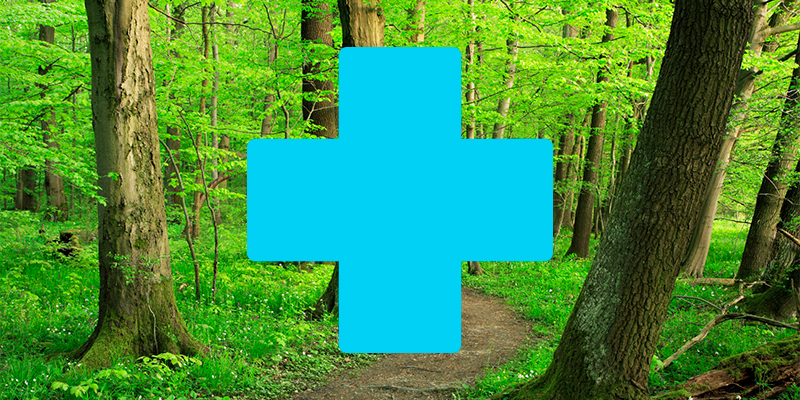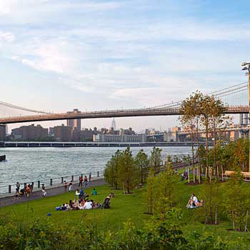Professional Practice
Adult: General Health

Want to live longer? Plant more trees. Fewer trees have been linked to greater deaths due to lower-respiratory tract and cardiovascular illness. American Journal of Preventative Medicine, 2013
According to the National Academy of Sciences, “nature-based recreation” has decreased 25 percent in the last 40 years. The truth -- one we all know without researchers and pundits telling us -- is that we spend more time inside and are increasingly more sedentary. Getting outside and active provides us with general health benefits.
How Nature Helps
Dr. Richard J. Jackson is integral in the push to design healthy communities. Dr. Jackson was director of the National Center for Environmental Health and star of the PBS series Designing Healthy Communities, as well as author of the series’ companion book. He believes that health issues begin not when a patient is unwell, but well before.
Dr. Jackson argues that people who live in communities that are walkable, have access to bike trails, and are near parks and green space have higher levels of health than those in communities lacking those amenities.
Recognizing that health benefits come from increased access to green space in cities, health insurance companies in Portland, Oregon were recently major supporters of a $227 million bond issue, which was dedicated to the acquisition of additional green space in that city.
 Brooklyn Bridge Park / Michael Van Valkenburgh Associates, Inc.
Brooklyn Bridge Park / Michael Van Valkenburgh Associates, Inc.
Research
Parks and Other Green Environments: Essential Components of a Healthy Human Habitat, National Recreation and Park Association, 2010
“Effect of Forest Bathing Trips on Human Immune Function,” Environmental Health and Preventative Medicine, 2010
“Morbidity is Related to Green Living Environment,”
Journal of Epidemiology and Community Health, 2009
“Vitamin G: Green Environments, Healthy Environments,” Utrecht University, 2008
"Contributions of Public Parks to Physical Health,"
American Journal of Public Health, 2007
“Healthy Nature Healthy People: ‘Contact with Nature’ as an Upstream Health Promotion Intervention for Populations,”
Health Promotion International, 2005
"Urban Residential Environments and Senior Citizens’ Longevity in Megacity Areas: The Importance of Walkable Green Spaces," Journal of Epidemiology and Community Health, 2002
“Beyond Toxicity: Human Health and the Natural Environment,” American Journal of Preventative Medicine, 2001
Resources
Explore More Resources:

Active Living, ASLA
Built Environment + Public Health Curriculum
"From Fitness Zones to the Medical Mile: How Urban Parks Can Best Promote Health and Wellness" The Trust for Public Land
"Parks are Part of Our Healthcare System," The Dirt blog
"Trees are a Matter of Life and Death," The Dirt blog
"How Cities Use Parks to Improve Public Health," American Planning Association
Green Cities: Good Health, University of Washington
Organizations
Designing Healthy Communities
Urban Greenspace Institute
American Trails
The Trust for Public Land
Outward Bound
Landscape and Human Health Laboratory, University of Illinois at Urbana-Champaign
Role of the Landscape Architect
Recognizing that having the opportunity to be active goes a long way in enabling people be active, landscape architects work with municipalities to design hiking and biking trails. In the case of the city of Portland, Oregon, the city quadrupled their bikeways and the number of bikers over a 20-year period.
Landscape architects also design large parks like Brooklyn Bridge Park in Brooklyn, New York and Griffith Park in Los Angeles that allow residents ample chances to engage in healthy outdoor exercise.
Landscape architects are vital in designing streetscapes and communities that allow us to walk and bike as we go about our day to day lives.
Case Studies
Brooklyn Bridge Park, New York City, New York, Michael Van Valkenburgh & Associates
Griffith Park, Los Angeles, California
Burbank Water & Power - EcoCampus, Burbank, California, AHBE Landscape Architects
Theater Commons and Donnelly Gardens at Seattle Center, Seattle, Washington, Gustafson Guthrie Nichol
<< Depression
Heart Health >>